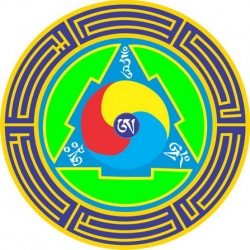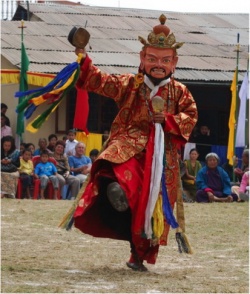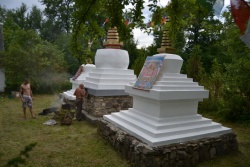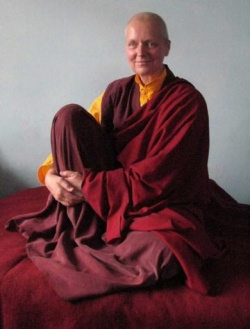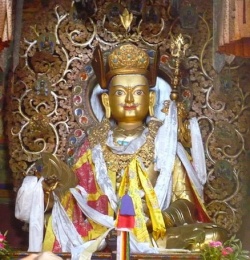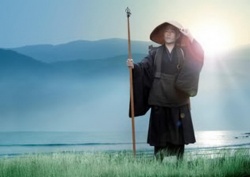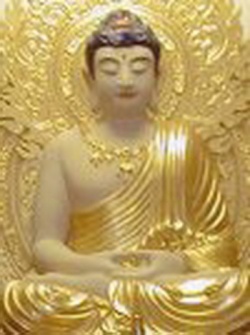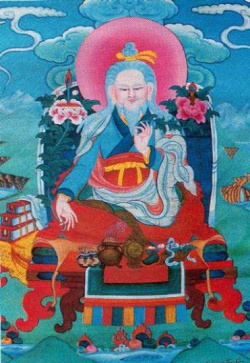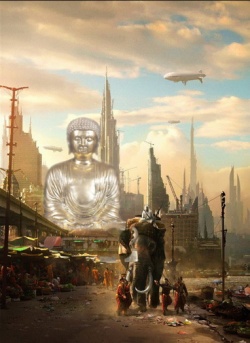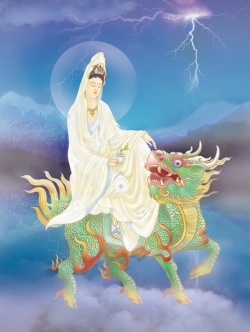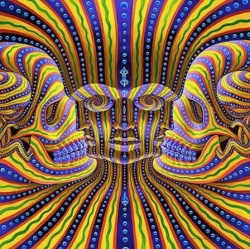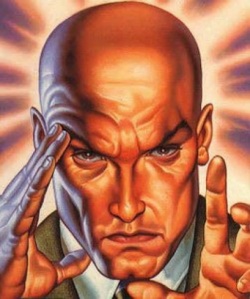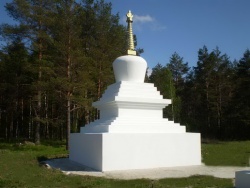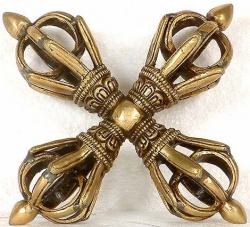Tales of the Living Buddha of Golden Mountain
On a hill called Golden Mountain outside the city of Zhènjiāng 镇江, in Jiāngsū 江苏 province, upstream from Shànghǎi 上海 and downstream from Nánjīng 南京, there is a monastery called the Monastery of Golden Mountain (Jīnshānsì 金山寺). In this monastery in the last days of the Qīng 清 dynasty and the early years of the Republic of China, there dwelt a monk with the religious name of Miàoshàn (妙善 “Wondrous Virtue Because he had not been ordained there, but was only visiting, people knew little about him.
People didn’t like Miàoshàn because he was undisciplined and unpredictable, but especially because of his habit of chanting “Who chants ‘I take my refuge in the Amitabha Buddha’?” (shéi niàn námó Ēmítuófó 谁念南无阿弥陀佛) in the middle of the night.
“Arrrgh! Who is chanting and disturbing everyone’s sleep in the middle of the night?!” they would ask. ‘That’s unconscionable!”
“It’s that crazy monk,” would be the answer.
23 Aug `11, 7:36PM
They were also disgusted by his way of spitting into the rice and by his squatting like a woman when he urinated. And so Miàoshàn was referred to by the phrase “crazy monk” (diān héshàng 颠和尚, which became his nickname.
He didn’t usually say much, though. He preferred simply to meditate.
Sometimes the Miàoshàn would meditate in very unusual places.
“Who’s sitting up in the top window frame of the pagoda? That’s really dangerous.”
“It’s the Crazy Monk.”
“Hey, Miàoshàn! That’s dangerous! Get down from there!”
“It’s O.K. I am going to conquer the evil of sleepiness!”
“Wow! He really is nuts. Oh well, let’s go.”
“Aaaaaaaaah”
“He’s fallen. Hurry. He surely killed himself!”
“He’s fallen. Hurry. He surely killed himself!”
But they found him sitting peacefully on the ground in front of the pagoda, still meditating.
“That’s really peculiar. He fell over a hundred feet!”
Quickly the word spread. “We saw a devil monk (yāosēng 妖僧) today!,” said one. “No, it has to be a living buddha (huófó 活佛),” said another. “Otherwise there could not be such a miracle.”
Many actions of the Crazy Monk were beyond normal comprehension, and the other monks at the Monastery of Golden Mountain knew he was not an ordinary person. The fame of the “Living Buddha of the Monastery of Golden Mountain” spread far and wide, and young and old, men and women, flocked from all directions to see him.
23 Aug `11, 7:39PM
Once he became famous, the Living Buddha spent his time wandering outside the monastery, free and unrestrained, “like floating clouds and wild cranes (xiányún yěhè 闲云野鹤,” as they say. Moreover, he continued to act in ways that were crazy and unruly. The other monks in the Monastery of the Golden Mountain could not longer tolerate him and tried to figure out ways to be rid of him.
“I suggest we get rid of the Crazy Monk. A real living buddha would not behave in like a demon that way (guǐyàngzi 鬼样子).”
“Not so fast. The Living Buddha attracts a lot of oil and grain to the monastery every year. At the annual Winter Meditation (chánqī 禅七) he brought in a lot of donations. He is a living benefit to the monastery. So how could we just throw him out the door?”
It was true that the Living Buddha had a large following of religious devotees. Even though he himself did not spend any of the money, each year his followers volunteered a lot of donations to the Monastery of the Golden Mountain, as well as to the Qīxiá Monastery (栖霞寺) in Nánjīng. So they really couldn’t afford to throw him out.
“Who’s chanting so deafeningly?”
“It’s the ‘Living Buddha’ again.”
“It figures. Sigh.”
One day in his wandering the Living Buddha stayed at the house of a follower named Hú 胡, who lived in Nánjīng, and who offered him a bath.
“Living Buddha, the bath water is ready,” said Mrs. Hú.
“Ah, but the body is only a dirty shell. It cannot be cleaned even if it is washed day and night,” replied Miàoshàn.
“But the weather is very hot. Please wash a little,” she urged politely.
“Oh very well, since you want me to. Normally I never bathe.”
In a little while Miàoshàn emerged. “All done,” he said.
“That was fast,” thought Mrs. Hú When she went into the bath room, she discovered that the water smelled strongly of sandal wood, and she called others to come and see, and everyone was amazed.
“If you think it smells so good, why not take a sip,” said Miàoshàn. It’s likely to heal your illness.”
“Odd, how did he know I had any illness?” thought Mrs. Hú. She in fact had not felt very well for several months. Indeed she felt quite exhausted all the time. So she took his advice and tasted the bathwater. Suddenly had a feeling like a stream of hot air rushing through her from head to foot.
“I feel warm all over my body. I can’t describe the relaxed feeling. It’s wonderful! Oh Living Buddha, you are truly a miraculous being (shénxiān 神仙)! You have healed me!” And she bowed before him
And so people began to come asking to drink some of the Living Buddha’s bath water, and his fame spread everywhere.
23 Aug `11, 7:40PM
A vendor was selling fish from great buckets, and people had come to buy them.
“How much do you charge per catty (jīn 斤)?”
“Seven and a half kuài 块.
But when Miàoshàn arrived he was filled with concern at so many dead and dying fish.
“Vendor, please give me your dead fish so that I can release them to live some more.”
“Release dead fish? Oh come on! You poor monk. You probably are not vegetarian and just want to cheat me of some dead fish so you can eat them. How could you release dead fish to live some more? Probably just by releasing them into your stomach!”
And the bystanders said the same thing. No-one thought releasing dead fish made any sense at all.
“Well naturally I would bring them back to life first before I let them loose,” Miàoshàn explained.
“That’s exactly the part nobody believes.”
“Well, let me try.”
“Okay. I tell you what: if you can bring dead fish back to life, I’ll give you all the fish here.”
“It’s a deal. Now just watch.” And he began to chant. In a short time the fish began to move.
“Wow! The dead fish are moving.”
“That’s really strange!”
“Every one of them has come back to life!”
“How did that happen?” asked the fish merchant, dismayed.
“Idiot,” said one of the customers. “This person is the famous Living Buddha of Golden Mountain.”
So the Living Buddha took the fish to the river and released them. They floated at the surface for a few minutes, winking and waving their tails.
“What are you hanging around here for,” asked Miàoshàn. “Hurry up and get away.”
“Now that’s truly remarkable,” said one of the crowd. And it truly was.
23 Aug `11, 9:31PM
This is the ” who take refuge in Amitabhva Buddha” song sang by the Golden Mountain monk in the early morning everyday
http://www.youtube.com/watch?v=50lHs3tVvIw
24 Aug `11, 11:59AM
A rich man in Nánjīng married his son to an extremely enchanting woman (yāoráo wànfēn 妖娆万分), but not long afterward the son became very ill. Although they went to the best doctors, they were told that the case was hopeless, and the lad would never again look upon his beautiful wife.
“Whatever shall we do?” wailed the sick man’s mother.
“Heaven help us!” cried his wife.
But then the sick man’s younger spoke up: “Is Older Brother going to get better?” he asked.
“Oh Second Son, your Older Brother’s illness is incurable,” said his mother. And his Older Sister-in-law began to sob.
“Don’t cry, Older Sister-in-Law,” said Second Brother. And he thought to himself how sad it would be for her to become a widow at such a young age. And she was beautiful too. Older Brother was really unfortunate to be leaving such a fine wife.
Meanwhile the wife of the sick man was thinking to herself, “Women need men like Second Brother. It is a really a misfortune that I have to be married to the older, sick brother instead of the fine younger one.”
As the days passed, Second Brother and Older Sister-in-Law became fonder and fonder of each other.
At length, Older Brother died, and the family went into mourning. Second Brother and Older Sister-in-Law fell more and more deeply in love. But they knew they could not marry even after the end of mourning because of their kinship. So they carried on only in secret and only after dark.
One day Second Brother’s mother heard a voice coming from her daughter-in-law’s room and immediately realized what was going on. “Good Heavens!” she exclaimed, and rushed to tell with her husband.
“Old Man,” she said, “how are you going to deal with this affair?”
“We certainly cannot let others hear of such shameful behavior,” he replied. “The only thing we can do is to find a wife for Second Son so that he has to break off the relationship with Older Daughter-in-Law.
A few days later Second Brother found Older Sister-in-Law in tears. “I just heard that Mother has found a match for you,” she told him.
“But I don’t want to get married,” he exclaimed. “I want to be with you forever.”
But he knew there would be no way to dissuade his parents. They called him in.
“Second Son,” said his mother. “I hope you will consider carefully what I are about to say so that you do not ruin the family’s reputation. I have already decided that next month you will marry the daughter of the Wáng 王 family.”
“I don’t want to. I absolutely do not want to.”
“You unfilial son! (nìzǐ 逆子)! How dare you corrupt the moral order of family relations!” shouted his mother. “I will die of anger!” And saying that, she collapsed and died.
“No, Mother! No!” cried Second Son.
“Poor old thing,” sobbed Father.
But the affair between Second Brother and Older Sister-in-Law continued for three years. Nobody knew about it, and the two of them continued much as before.
One day, Older Sister-in-Law’s eyes became swollen, and she could not see. But the doctors couldn’t help her.
“I have no way of curing this,” said one.
“I can’t tell what the illness is,” said another.
The condition continued for over two months, and there was no improvement at all. Older Sister-in-Law cried and cried. Finally one of the family servants had an idea.
“Young Mistress, don’t cry. I have heard that the Living Buddha of Golden Mountain can cure strange illnesses. Perhaps it wouldn’t hurt to give him a try.
“But where do we find this ‘Living Buddha of Golden Mountain’?” she asked.
“I heard he was living in the house of our next door neighbor, Mr. Hú. You could go early tomorrow.”
And indeed, there was a distant sound of chanting on the evening air.
The next morning his own violent sneeze jarred Miàoshàn from his meditation and he became aware that something was happening in the house.
“Disciple Hú,” he asked, “do I have any visitors today?”
“I am here to report that the young mistress who lives next door asks to see the Living Buddha.”
“Show her in.”
When Older Sister-in-Law came into the room, the Living Buddha was chanting.
“Living Buddha?” she ventured timidly.
He scowled and continued to chant.
“Living Buddha, please help me.”
More chanting.
“Please, Living Buddha.”
The chanting stopped.
“This kind of woman should suffer more so she can learn to behave properly,” he said. “You have asked for this suffering. Do you know you have done something wrong?”
“No,” she said. It seemed like all she could say.
Miàoshàn turned to face her. “You are still trying to argue. You have ruined people’s lives, obstructed someone on his way to establishing a family and taken an innocent life. This is your immediate retribution!”
“All right. I admit my faults. Please help me.”
“It’s lucky for you that you met me. But you must obey my instructions for me to cure you.”
“First, beginning today you must repent and break off your affair with your husband’s younger brother. Second, you must abide by the Three Treasures (sānbǎo 三宝, the Buddha, the Scriptures, and the Clergy]. Third, you must follow a vegetarian diet, study scriptures, and worship buddhas.”
“I will do all this, if only you will cure my disease,” said Older Sister-in-Law.
“Very well,” said Miàoshàn. “Sit down and don’t move.”
Suddenly he lurched forward upon her and began sucking at her eyes.
“Ouch!” she shouted. “Ouch! Ouch!”
Mr. Hú and the servant from Older Sister-in-Law’s house looked at each other.
“The ways the Living Buddha cures diseases are full of surprises,” said Mr. Hú.
“He is even sucking out pus with his mouth,” said the servant.
Miàoshàn took a glass and spat a stream of liquid into it.
“Look at this,” he said.
“It looks like black water. It isn’t either pus or blood.” said Mr. Hú.
Miàoshàn turned to Older Sister-in-Law. “This is your wrong-doing,” he said. “Drink half of it. In compassion for you, I’ll help you drink the other half.”
Then he spat in his hand and blew nasal mucus in as well, and said, “Come over here now.”
Older Sister-in-Law walked toward the sound of his voice. Suddenly he smeared here eyes with the mixture in his hands.
“Does it still hurt?” he asked.
“No, not any more,” she said.
“Then open your eyes and look around.”
“Oh! I can see the light! Living Buddha, I am ready to abide by the Three Treasures.”
“He is magnificent!” muttered Mr. Hú.
“Truly he is an incarnation of the Buddha (Rúlái 如来),” said the servant.
